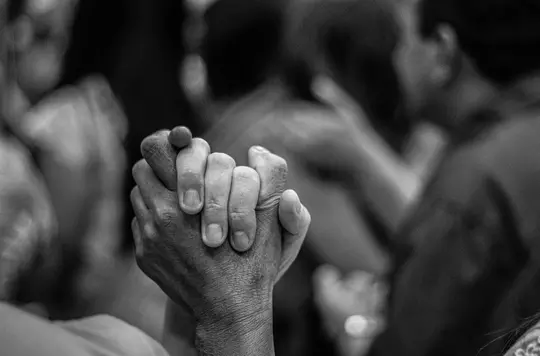25 January 2025
Make a stand: Prayer and pushing back the darkness
Lyndall Bywater

Lyndall Bywater encourages us to push back the darkness and change the atmosphere around us.
At the Encounter Prayer Gathering this weekend, we are discovering something of Jesus’ approach to spiritual warfare, and how we, his followers, can learn from him as we make our stand.
What comes to mind when you think of spiritual warfare? I imagine the phrase might conjure thoughts of demonic powers and intense prayer, and I certainly wouldn’t rule those out, but when we look at Jesus, we don’t see someone who just got involved in sporadic skirmishes with the Enemy. We see someone whose life – and death – were all about pushing back darkness.
Two months ago, a hero of mine died. His name was Tony Campolo, and I learnt more from him about spiritual warfare than I’ve ever learnt from any of the talks, books or wise teachers I’ve consulted over the years. Tony shaped my understanding of this most complex of topics, yet I never heard him do a single talk on it. What I learnt from were the stories of how he lived.
Take the story of a sleepless night in Honolulu, for instance, when he found himself in a bar surrounded by women who made their living through prostitution. On discovering it was one of the women’s birthday the following day, he arranged with the owners of the bar to throw her a party, complete with decorations and cake. For a few hours, that precious woman felt loved, and I can’t help but believe that the darkness around her was pushed back.
Tony learnt from the best. John’s Gospel tells us that Jesus came to be a light that the darkness could not overcome (see John 1:5), and John’s first epistle tells us that he came to destroy the works of the evil one (see 1 John 3:8). It sounds like the manifesto for a comic book superhero, doesn’t it? But Jesus wasn’t the swashbuckling type. He didn’t battle darkness by brandishing a shiny sword or firing up a heavenly lightsabre. His weapons were a word of hope, a compassionate touch, a commitment to truth and a love that knew no limit.
If you were going to launch your ministry as a rabbi with a miracle, what might you choose to do? You’d want it to be a signature piece, wouldn’t you? Something that would give people a glimpse of the things that were important to you?
In John 2:1–11, we find Jesus caught up in a wine shortage at a wedding. His mum seems to think this is his moment, but he’s not convinced. Is that because this doesn’t seem like the kind of miracle a serious rabbi should be starting out with? Whatever his reservations, he heeds his mum’s advice and gets on with changing water into wine.
His first miracle reveals him as the one who can make a good party even better. This is where destroying the works of the Evil One begins: helping a young couple to have a better wedding than they could have ever imagined.
The Message’s paraphrase of 1 John 3:8 says: ‘The Son of God entered the scene to abolish the Devil’s ways.’ Jesus didn’t just come to dispatch a few demons; he came to change the atmosphere. He came to open the windows and let in a breath of heavenly fresh air to disperse the suffocating stench of lies, shame, divisiveness and corruption. He came so that the wine wouldn’t run out; so that we would know that the best is yet to come. Wherever Jesus was, light shone, and the darkness had to back off.
The books I have read on spiritual warfare have generally been excellent, but they’ve all left me feeling like it’s a specialist skill. There are likely to be times when I do need to draw on that kind of wisdom but, if I’m to follow Jesus’ example, then the vast majority of spiritual warfare will be that privileged task of pushing back darkness by changing the atmosphere. When we bring the light of Jesus into the room, all darkness must flee. That’s spiritual warfare the Jesus way.
Changing the atmosphere in 2 steps
1. Notice the darkness
You can’t push darkness back if you’re not aware of it. We get so used to the atmosphere being shaped by things like hopelessness, strife, anxiety and confusion that we don’t always notice they are there. Ask the Holy Spirit to teach you to recognise the atmosphere you’re in and to discern whether there’s any darkness at work in it. Then ask God to help you be an agent for change.
2. Make your stand
Changing atmospheres is rarely done by an act of great heroism. Hardly anyone at the Cana wedding knew what Jesus had done. We change the atmosphere by identifying the darkness, then quietly, faithfully standing for something different (see Exodus 14:13). That could involve…
- Smiling when everyone around you is looking grumpy.
- Saying something positive about a work colleague when everyone else is criticising them.
- Giving generously when people fear that there isn’t enough.
- Speaking honestly when no one is speaking up.
- Reaching out when there has been conflict or division.
- Choosing to believe when others are finding it hard to have faith.
- Praying big prayers in impossible situations.
Written by

Lyndall Bywater
UKI Boiler Room Team
Discover more

Territorial Prayer Network Coordinator Major Gary Lacey talks about the first year of the UKI Boiler Room.

Ease yourself into the day with a relaxed mix of music, chat and a few inspirational moments to stir your soul.

